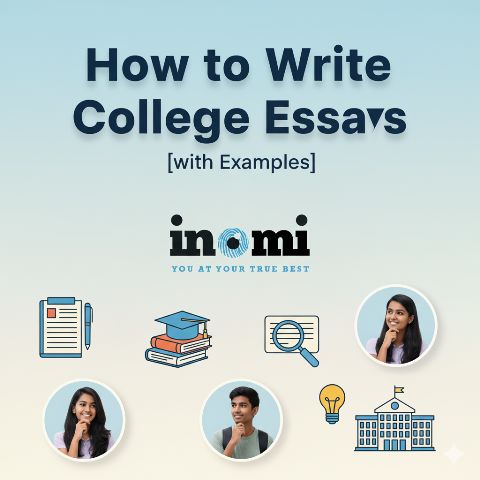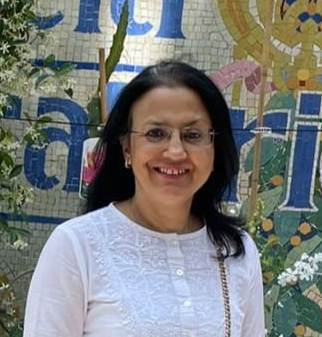![How to Write College Essays [with Examples]](https://inomi.in/blog/wp-content/uploads/2025/10/how-to-write-college-essays-Inomi.jpg)
Applying to college can feel overwhelming, but your college essays are the part you actually control. They’re your chance to show who you are beyond grades and test scores. Whether it’s a Common App personal statement, UC PIQs, a quirky UChicago prompt, a UCAS personal statement for the UK, or a “Why This College” supplement, the principles are surprisingly similar: be authentic, specific, and reflective. Here’s a guide to help you tackle each one with confidence.
Common App Essay: Your Personal Story
The Common App essay is all about you. Admissions officers want to meet the person behind the transcript, so pick a topic that reveals your character, values, or personal growth. Focus on reflection, not just events—show how an experience shaped you. Use vivid details and anecdotes to bring your story to life, and write in a natural voice, as if you’re talking to a thoughtful friend. Great essays are rewritten, so don’t be afraid to revise multiple times. The most memorable ones are authentic, specific, and full of your unique perspective.
Inomi student’s example:
“I’m inexplicably attracted to the unsolved. I find myself on the brink of obsession, unable to find sleep until I find an explanation. Sometimes, I see my brain like a softboard, pinned with my thoughts. Connecting these ideas are red strings, like those used by detectives to solve a crime. But so far, there is no center to these strings. The one link connecting them all remains, simply, me.”
Related Article: How to Write Common App Essays
UC PIQs: Your Chance to Show Depth in Multiple Dimensions
The University of California Personal Insight Questions (PIQs) are a set of prompts that let you showcase different aspects of your personality, experiences, and values across multiple responses. Each response should highlight a distinct strength or experience, whether it’s leadership, resilience, creativity, or intellectual curiosity.
Be specific—give concrete examples and reflect on what you learned or how you grew. This is your chance to show breadth and depth, so think strategically: pick experiences that together paint a full picture of who you are and what you care about. Keep your tone authentic, concise, and reflective, and make sure each essay complements the others to create a cohesive narrative.
Inomi student’s college essay example:
Chosen prompt: Describe the most significant challenge you have faced and the steps you have taken to overcome this challenge. How has this challenge affected your academic achievement?
Response: “I was my own worst enemy, I realized. I let everyone influence my decisions—except myself. I knew then that only once I take control over decisions that are rightfully mine will I truly feel confident in myself.
Painstakingly, I tried to bring about this change. I attended therapy regularly and relied on my friends and family for constant support. I tried to speak up in class, eventually volunteering for lead roles in class presentations. MUNs, a nightmare for people like me who feared public speaking, didn’t seem so scary anymore. I led my committee logistics team with firmness and grace, asserting myself where required. I shared my love for books over the “BookBibuli” podcast.”
UChicago Essays: Embrace Creativity
UChicago is famous for its unconventional prompts, which reward creativity and curiosity. Think of the essay as a puzzle—there’s no single “right” answer. Take risks and show your ability to think differently, whether through humor, bold metaphors, or an unexpected perspective. Even with creative prompts, keep a clear structure so the reader can follow your thinking. And amid all the cleverness, make sure your personality and academic interests shine through.
Inomi student’s example:
Scar’s physical deformity led to a lifetime of ridicule and isolation. Gaston always needed to publicly prove himself. Hades was timelessly neglected and overshadowed. What Disney Villain do you feel was not mischievous nor wicked, but just misunderstood?
This student chose to create their own question and write an essay on it. This choice demonstrates the child’s confidence in their own abilities. The question is quite unusual as well, once again making the student immediately stand out and memorable. Besides this, UChicago wants the students to be creative, funny, and bold in their essays. As they’ve clearly mentioned in their prompt- take a little risk, and have fun!
“Thanks to Walt, I know how to spot the villain like a white-collared expert. Someone bragging a bit much about their grades? That’s a bad person. That celebrity on TV got caught blatantly ignoring two of her fans? She must be of ill intent. My teacher, promising to take a few days to mark our tests, who ends up returning them 3 months late? Yeah, she definitely has a rotten soul. Ingrained in us from the moment we see that iconic castle come into frame, we seem to only have a black or white concept of what is ‘right’ and ‘wrong.’ And all Disney’s characters fall in those exact categories, scaring little toddlers since they were in diapers. I remember taking three months to recover after first hearing Jafar’s malevolent cackle at age 6.”

UCAS Personal Statement: Academic Passion First
For UK universities, the UCAS personal statement is less about personal storytelling and more about your academic passion and preparation. Start by explaining why you want to study your subject and what sparked your interest. Highlight your academic engagement—projects, extra reading, lectures, or independent research—since this should make up the bulk of your essay.
Show the skills that will help you succeed, like critical thinking, problem-solving, and research ability. Keep it universal, because one statement goes to all your chosen universities, and avoid naming a specific school.
Inomi student’s example:
“My interest in psychology peaked in middle school when a friend was diagnosed with anorexia and anxiety disorder. Since then, I have studied various disorders and therapeutic tools to help people overcome such challenges. I hope to study psychology with a focus on clinical practice, and work with young people to help them overcome emotional and developmental challenges.
I find the biopsychosocial approach to human behaviour most engaging, especially the diathesis-stress model, which explains how heredity and environment interact to trigger abnormal behaviour. For instance, Robert Sapolsky’s lecture on schizophrenia helped me understand how its onset is often precipitated through adolescent stress. I gained more insights into the genetic basis of psychological disorders by reading “The Gene” by Siddhartha Mukherjee, which discusses a family affected by mental illness. Having seen my grandmother struggle with depression, and my aunt deal with bipolar disorder, I am keen to research the genetic links between disorders further.”
Related Article: How to Write the UCAS Personal Statement
“Why This College” Essay: Prove the Match
A strong “Why This College” essay shows that you’ve done your homework and that the school is the perfect fit for you—and vice versa. Highlight specific programs, courses, professors, or unique opportunities that excite you, and explain why they matter to your academic or personal goals. Show how you’ll contribute to the campus community through your perspective, skills, or experiences.
Avoid vague phrases like “great academics” or “amazing campus life”; details make your essay stand out. Keep your tone authentic—enthusiastic but not over-the-top—and structure your essay so it flows naturally from your hook to academic fit, community fit, and why this college is the right place for you to grow. Personal stories that tie into the college’s offerings make your essay memorable and convincing. Learn more about how to write effective supplemental essays for college admissions.
Inomi student’s college essay example:
“I want to build on this passion through the Thermal, Fluid, and Energy Systems concentration at Tech. Courses like Energy Systems Analysis and Design, combined with the Engineering and Business minor, provide the perfect springboard to create change.
The idea that scalable tech solutions can uplift billions of lives inspires me, and Tech offers the perfect crucible for me to begin my journey of interdisciplinary learning, collaboration, and innovation.”
Quick Tips on How to Write Successful College Essays
Start early
Set aside lots of time — weeks or even months — so you’re not under pressure. More time = more ideas, more revisions, fewer errors.
Understand the prompt thoroughly (and deeply)
Don’t skim — dissect what the essay is looking for. Ensure each paragraph you construct pertains to and responds to the prompt.
Be authentic and personal
Be yourself, not what you believe admissions officers want to hear. Write about something that really resonates with you.
Don’t tell, show
Tell a story — don’t just list things. Use anecdotes, scenes, and moments to reveal your strengths rather than stating them. This makes your writing vivid and memorable.
Focus on reflection and growth
What did you change in yourself due to that incident? How did you behave or think differently later on? That reflection usually counts more than the incident itself. Don’t focus too much on what you did.
Make it focused & narrow
Don’t attempt to tell your whole life. Concentrate on one moment, one idea, or one inner conflict and explore it in depth.
Write several drafts & revise extensively
Your initial draft is a baseline. Subsequent rounds are where you trim, refine, simplify, and hone.
Read aloud & get feedback
Reading your essay out loud assists you in detecting clumsy phrasing, redundancies, or areas where the argument fails. Also, have others (teachers, mentors, peers) read and comment.
Be concise & trim the fat
Each word must carry its weight. Cut filler, overused expressions, and repetitiveness. The more specific you are, the more powerful your writing is.
Make your ending count
Don’t leave so abruptly. Use the conclusion to reaffirm your message, reflect one more time, or leave the reader with something significant to think about. A solid close can elevate the entire essay.
Acknowledgement: This article has been co-authored and edited by Tanmoy Ray.

Eeva started her career in Retail Banking with U.S. Bank in Minneapolis. She has experience covering business analysis, operational supervision and management. Eeva has a passion in education and IB philosophy and has been guiding and mentoring parents and students in their educational and college counselling journey across STEM areas for the US and for their school journey. As a trained IB facilitator and a long-term parent representative, Eeva is deeply immersed in the parent and school experience as well. Eeva holds a Bachelor’s degree (International Business and Economics) from St. Catherine University, Minneapolis, USA, and also possesses Certificate Level Courses in IB Education, George Mason University, Fairfax, USA.
